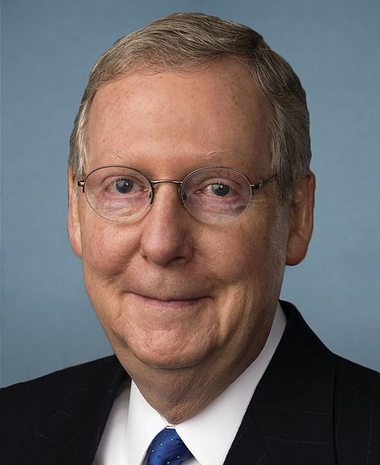Senators: spending stumbling block to budget deal

DONNA CASSATA, Associated Press
WASHINGTON (AP) — Senate Republicans and Democrats hit an impasse Sunday over spending in their last-ditch struggle to avoid an economy-jarring default in just four days and end a partial government shutdown that enters its third week.
After inconclusive talks between President Barack Obama and House Republicans, Senate Majority Leader Harry Reid, D-Nev., and Minority Leader Mitch McConnell, R-Ky., have taken charge in trying to end the crises.
The two cagy negotiators are at loggerheads over Democratic demands to undo the automatic, across-the-board spending cuts to domestic and defense programs that the GOP see as crucial to reducing the nation's deficit.
The latest snag comes as 350,000 federal workers remain idle, hundreds of thousands more work without pay and an array of government services, from home loan applications to environmental inspections, were on hold on the 13th day of the shutdown.
Unnerving to world economies is the prospect of the United States defaulting on its financial obligations on Thursday if Congress fails to raise the borrowing authority above the $16.7 trillion debt limit.
Christine Lagarde, the International Monetary Fund's managing director, spoke fearfully about the disruption and uncertainty, warning of a "risk of tipping, yet again, into recession" after the fitful recovery from 2008.
The reaction of world financial markets and the Dow Jones on Monday will influence any congressional talks.
McConnell and Republicans want to continue current spending at $986.7 billion and leave untouched the new round of cuts in January, commonly known as sequester, that would reduce the amount to $967 billion. Democrats want to figure out a way to undo the reductions, plus a long-term extension of the debt limit increase and a short-term spending bill to reopen the government.
"Republicans want to do it with entitlement cuts," said Sen. Chuck Schumer, D-N.Y. "Democrats want to do it with a mix of mandatory cuts, some entitlements and revenues. And so how do you overcome that dilemma? We're not going to overcome it in the next day or two. But if we were to open up the government for a period of time that concluded before the sequester took place, which is Jan. 15, we could have a whole bunch of discussions."
Republicans dismiss the request as Reid moving the goalposts in negotiations as they were getting closer to resolving the stalemate that has paralyzed Washington. They also argue that it is disingenuous for Democrats to resist any changes in the 3-year-old health care law while trying to undo the 2011 budget law that put the cuts on track.
"I think the Democrats are on the verge of being one tick too cute as they see the House possibly in disarray — they now are overreaching, and I think that what we've got to do is get this back in the middle of the road, act like adults," said Sen. Bob Corker, R-Tenn.
Sens. Lindsey Graham, R-S.C., and Rand Paul, R-Ky., said they would not support any deal that upends the spending limits imposed by the 2011 law, and predicted that their Senate GOP colleagues would oppose it as well.
Plus the House and its fractious Republicans remained a possible headache in the coming week.
"I think at this point we've got to figure out a way to get something out of the Senate that we think is close enough for the House to accept," Corker said.
Out of play, for now, was the Republican-led House, where Speaker John Boehner, R-Ohio, told GOP lawmakers early Saturday that his talks with the president had ground to a halt.
Also sidelined, at least for now, was a plan forged by Sen. Susan Collins, R-Maine, and a bipartisan coalition to briefly fund the government and extend the $16.7 trillion debt limit, in exchange for steps like temporarily delaying the medical device tax that helps fund the health care law.
Democrats said Collins' plan curbed spending too tightly, and Reid announced Saturday it was going nowhere.
Collins said Sunday that both Democrats and Republicans continue to offer ideas and say they want to be part of the group working to reopen the government and address the debt ceiling before Thursday's deadline.
"We're going to keep working, offering our suggestions to the leadership on both sides of the aisle in an attempt to be constructive and bring this impasse to an end. Surely we owe that to the American people," Collins said.
Sen. Amy Klobuchar, D-Minn., said she sees the Collins plan and the fact that the Senate leaders are talking as a positive going forward.
"We need that right now," she said. While Reid wouldn't accept everything in the Collins plan, she said Reid "knows there are some positive things in that plan," such as opening the government in a "smart timeframe" not defaulting on debt and doing something in the long term on the budget.
Senate Republicans dealt Democrats an expected setback on Saturday by derailing a Democratic measure extending the debt limit through 2014 without any conditions. The vote was 53-45 to start debating the Democratic measure — seven short of the 60 votes needed to overcome GOP obstruction tactics.
Klobuchar and Collins were on CNN's "State of the Union." Graham appeared on ABC's "This Week," Corker was interviewed on "Fox News Sunday," Schumer spoke on CBS' "Face the Nation" and Lagarde was on NBC's "Meet the Press."
___
Associated Press writers David Espo, Kimberly Hefling and Michele Salcedo contributed to this report.
Copyright 2013 The Associated Press. All rights reserved. This material may not be published, broadcast, rewritten or redistributed.
October 13, 2013





